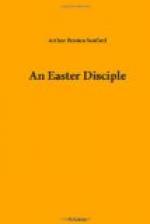AN OPENING WORD
Many voices had been speaking of eternal life, before the days of the Son of man. Especially pronounced had been the teachings of the Egyptians that there is another world. In their Acadian hymns the Chaldaeans had dimly foretold a future life. The belief of the Parsees, as expressed in their Zend-Avesta, had included a place of darkness for the evil soul and a reward for the good in the realm of light. The Hindus had declared, in their Rig-Veda, their beautiful conception of the immortality of the soul, and had written of a future “imperishable world, where there is eternal light and glory.” The Grecian and Roman mythologies had voiced their hope of blessedness for the shades of the departed. Everywhere serious men had been asking as to the experiences beyond the grave. It was as if the Eastern world had become a vast parliament chamber, wherein the nations were proclaiming their different doctrines as to a future life.
In the midst of these varying and uncertain voices, Christ spoke his authoritative message. There was no wavering in his tone. What the Oriental philosophers were guessing, he revealed; what the Hebrew prophets had foreshadowed in their holy writings, he unfolded in full light. The ancient Vedic hymns, the oracles of Greece, the Egyptian Book of the Dead, anticipating by two thousand years the Hebrew exodus—all these are naught compared with the words of that inspired Teacher who spoke in Palestine.
In addition, Christ was himself the vital evidence of the resurrection which he taught. Against the assaults of doubt his unique teachings are buttressed forevermore by his own return from the land of silence. In a short week after his words to Martha at Bethany he had become, through his own rare experience, the resurrection and the life. Not the dead Buddha, nor the departed Zoroaster, nor the vanished Pythagoras ever came back through the opened door of the sepulcher, wearing the grave clothes of those who sleep. Human fancy had never dreamed of such a rapturous denouement for faiths other than Christianity. The resurrection of the Lord is the crowning narrative with which the Gospels close. It is a risen Christ who repairs the wastage of human decay and death. A voice above all those from Ind or Persia or the Nile speaks henceforth in Judaea and the world concerning immortality. The superlative Easter argument is the risen Christ himself.
I
A ROMAN QUEST
“If one might only have a guide to the truth.”—Seneca.
On Scopus, the high mountain north of Jerusalem, the Roman camp was pitched, that last autumn in the ministry of Jesus of Nazareth. A few years further on, if the warriors of the Emperor Tiberius could then have foreseen the future, Titus was to quarter his famous legions on that vantage point; and from its elevation he was to hurl himself as a resistless battering ram against the Holy City. But, on this autumn day, when these chronicles begin, no blare of trumpets was summoning the Roman soldiery to arms; only the feet of the camp sentinels, as they walked their appointed rounds, broke the quiet of the sunlit afternoon.




